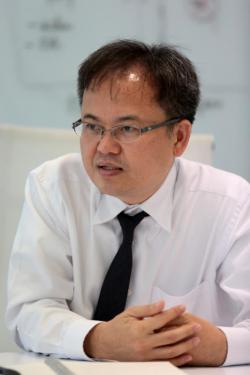R&D reboot goes for economic pay-off
Research spending to focus on commercial applications.
19 มิถุนายน 2560
.gif)
Thailand has launched a major revamp of the country's research and development (R&D) systems as it seeks to adopt Chinese and Japanese models to focus on innovations which drive the economy.
Meanwhile, local researchers have been urged to conduct more productive research after more than 100,000 projects were left on the shelf.
Prime Minister Prayut Chan-o-cha issued a Section 44 order to ease work on the revamp last year, dissolving several R&D bodies with overlapping tasks.
A new national body -- the National Research and Innovation Policy Council -- has been established to oversee the changes. Chaired by the prime minister, the council comprises two deputy prime ministers,...
The council will act as a single command body for formulating policies to drive R&D, science, technology and innovation to support growth.
Kitipong Promwong, secretary-general of the Science Technology and Innovation Policy Office (STI) and member of the council, said the council has come up with several reforms to the country's R&D system...
Local research, mostly from universities nationwide, will be screened, with the council selecting those projects which can be commercialised or further developed.
Initially, it is estimated that only few hundred of the 100,000 pieces have such potential.
Mr Kitipong said most research is conducted with the aim of having it published in international journals so researchers can use the publications to justify a promotion.

As the result, most local research is conducted on a laboratory scale which can be hard to commercialise, resulting in scattered industry funding.
The size of funding for each research piece is 500,000 baht to three million baht.
With R&D dispensed on such a small scale, it can be hard to reach the ultimate goal of product and innovation outcome.
According to Mr Kitipong, the size of funding which can generate commercial product outcomes must be at least US$ one million, about 34 million baht.
It requires at least 100 million baht for the R&D which aims to make a product and commercialise it in the international market.
The required budget will rise to 200-300 million baht for R&D involving IT products and exceed one billion baht for biomedical products.
Under the revamp plan, the country's research funding will be restructured. Research grants will be more selective and priority will go to large-scale R&D which aims to achieve a new product or innovation.
Researchers may have to form a partnership with the private sector to conduct research which will result in outcomes that can be commercialised easier.
Extra technology may be needed.
"This is the model China used to uplift its technological development and Thailand aims to follow suit,"
Mr. Kitipong said.
Meanwhile, the country will adopt a Japanese model for research management which will suit large-scale projects.
Under the model, a consortium has to be set up to operate and manage a targeted R&D project. The consortium comprises researchers, the private sector, state agencies, and the funding agency.
A research manager must be an expert in that research field.
Mr Kitipong said law amendments will be needed for the revamp. Under current laws, copyrights and research patents belong to the funding agency. After the change, the rights will belong to researchers.
In addition, the private sector would be allowed to seek R&D grants from state funding agencies.
Targeted industries for the new funding direction include modern agriculture, smart farming, food biotechnology, biomed, digital economy, logistics, high value-added services, energy, robotics and automation.
Targeted industries for the new funding direction include modern agriculture, smart farming, food biotechnology, biomed, digital economy, logistics, high value-added services, energy, robotics and automation.